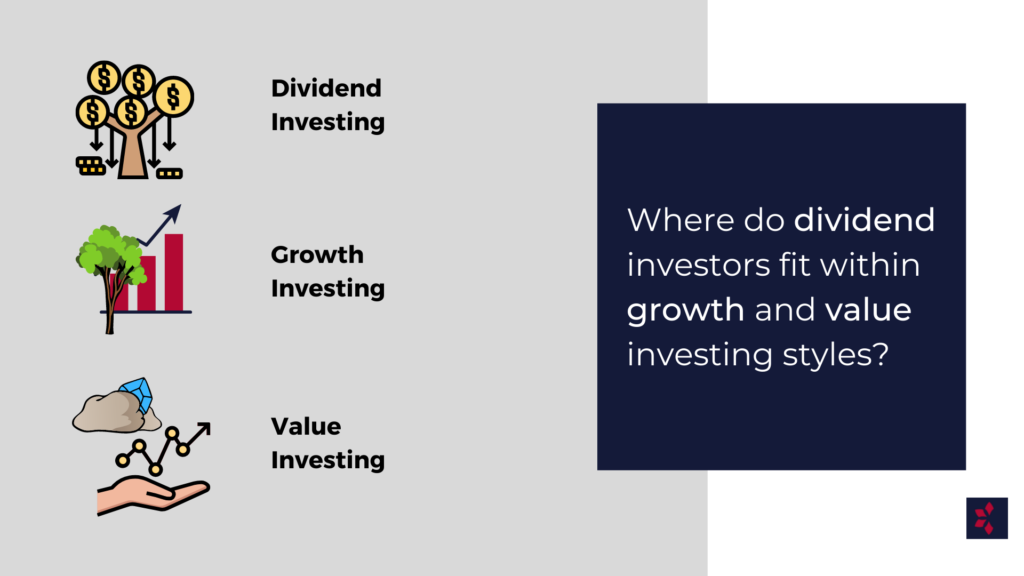Where Do Dividend Investors Fit within Growth and Value Investing Styles?

As a follow on to our articles Growth vs. Value Investing—How do These Two Styles Differ? and Can You Be Both a Growth and a Value Investor?, in this article we focus on income (dividend) investing as it pertains to equity portfolios. What is income (dividend) investing and where do dividend investors fit within growth and value investing styles?
Income (Dividend) Investing and Where it Fits within Growth and Value Investing Styles
Income (or dividend) investing is an investing style where stock selection is driven by a company’s ability to provide a steady stream of income paid out to investors by way of regular dividends.
A dividend is a method by which companies distribute their earnings to shareholders. Dividends typically take the form of cash payments.
Dividend-paying stocks provide investors with two components of return: the dividend income (the amount of income that a company pays monthly or quarterly to investors) and in addition, the potential capital gains (increase in value of the stock itself).
By this definition, income (dividend) investing is not necessarily an equity style in and of itself, as growth and/or value criteria may be applied when evaluating the underlying stock as a viable investment.
When selecting dividend-paying companies, important factors include:
- a long-term record of paying consistent or increasing dividends;
- a dividend yield that is sustainable;
- a reasonable dividend payout ratio relative to its cash flow and balance sheet (measure of dividend sustainability);
- a demonstrable dividend payout policy; and
- strong underlying company fundamentals.
The longer a company has been paying a reasonable dividend, the more likely it is to continue paying that dividend. It is important to find an acceptable balance between stock price and dividend yields.
Some investors are not that interested in dividends; however, the income investing strategy is more than simply screening for companies that pay the highest dividend yield.
Of utmost importance is the sustainability of a company’s dividend payment. Accordingly, the company must pass extensive fundamental analysis. As a result, many dividend portfolio companies may also benefit from price appreciation owing to their growth or value attributes.
Benefits of Income (Dividend) Investing
Dividends present real value for investors who want to grow their money over time. The risk associated with dividend-paying stocks can be much lower than with other investing styles as dependable dividend payers are typically fundamentally sound companies.
Dividends stocks can not only provide a reliable stream of cash flow in the form of dividend income, if desired, but can also provide a source of income to reinvest. Over the long term, it has been demonstrated that dividend-paying stocks outperform non-dividend paying stocks.
There is also a benefit to Canadian taxable investors. Investing in dividend-paying stocks substantially increases the after-tax return for Canadian taxable investors, given that eligible Canadian dividends are taxed at a lower rate than other income.
Dividend Investing is a Total Return Approach
Restating that a growth and/or value criteria may be applied for dividend-investing when evaluating the underlying stock as a viable investment, this total return approach, or long-term, “value”-oriented dividend “growth” mindset, enables dividend investors to grow wealth and income over time.
Dividend investors adhering to this investment approach are not short-term traders/speculators/gamblers, but true investors who avoid the meaningless day-to-day pricing noise in the market and can reap the long-term benefits of investing in companies for the long-term.
At Bloom Investment Counsel, Inc., we have been creating dividend-paying investment portfolios to help protect, preserve and build our clients’ wealth through the combination of dividend-income and capital appreciation since 1985. Learn more about our customized, investment management service.
This content is provided for general informational purposes only and does not constitute financial, investment, tax, legal or accounting advice nor does it constitute an offer or solicitation to buy or sell any securities referred to. Individual circumstances and current events are critical to sound investment planning; anyone wishing to act on this content should consult with his or her financial partner or advisor.